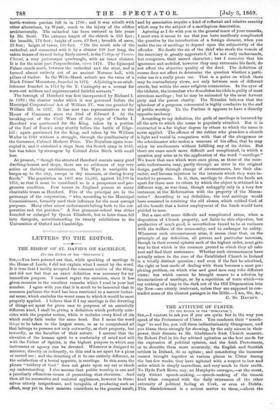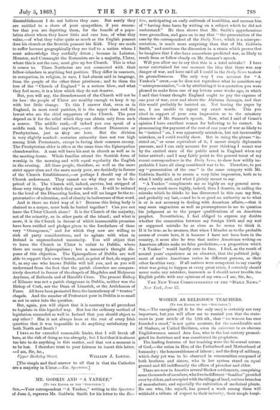THE ATTITUDE OF ULSTER.
[To THE EDITOR OF TH1 " SPIICTITOR.1 SIR,—I venture to ask you if you are quite fair in the way you. speak of the Protestants of Ulster. You condemn their " marclr- ings" to and fro, you call them indiscriminately Orangemen, and you blame them strongly for showing, by the only means in their power, their distaste to Mr. Gladstone's Irish Church measure.. Sir Robert Peel in his day advised agitation as the best mode for- the expression of political opinion, and the Irish Protestants,. or to describe them more accurately, the English and Scottish. settlers in Ireland, do so agitate ; and considering the immense masses brought together at various places in Ulster during the last few weeks, they have agitated with a respect to law and order which is simply marvellous, and very much to their credit.. No Hyde Park Riots, nay, no Murphyite outrages,—at the worst, only violent speech-making, — speech-making of the tamest kind when compared with the daily utterances of the other extremity of political feeling at Cork, or even at Dublin.. This disendowment is a serious matter to them,—about the
disestablishment I do not believe they care. But surely they are entitled to a share of your sympathies, if you remem- ber that you are depriving them, for the benefit of a popu- lation about whom they know little and care less, of what they value,—of what they value quite as much as the English peasant does his church or the Scottish peasant his Kirk. They are made to suffer because geographically they are tied to a nation whom I must acknowledge they cordially detest ; because in Leiuster, Munster, and Connaught the Romanists are in a majority, Ulster, where this is not the case, must give up her Church. This is what it comes to. These Northerns are not connected with their fellow-islanders in anything but position. They differ in manners, in occupation, in religion, in race, I had almost said in language, from the people of the other three provinces ; and to them the loss of the "Church of England" is a serious blow, and what they feel more, it is a blow which they do not deserve.
But, you will say, the disendowment of the Church will not be its loss : the people of Ulster are wealthy enough to keep it up with but little change. To this I answer that, even as in England, in most rural parishes, it is the upper class and the lowest who are the chief supporters of the Church. The poor depend on it for the relief which they can obtain only from such a source. The middle rank,—if indeed you can speak of a middle rank in Ireland anywhere,—are oftener Dissenters or Presbyterians, just as they are here. But the division is very slightly marked : sectarian animosity does not run high among Irish Protestants, except in facing their common enemy. The Presbyterian elder is often at the same time the Episcopalian churchwarden. A man will have his seat in church as well as in the meeting-house. Whole families attend the Scottish form of worship in the morning and with equal regularity the English in the evening. All these people, therefore, as well as the more strict upper class and the more needy poor, are decidedly in favour of the Church Establishment,—or perhaps I should say of the Church endowment. They cannot see why they are to be de- prived of it. The Church will, indeed, survive, but stripped of those very things for which they now value it. It will be reduced to the level of the Dissenting bodies, and will no longer be the re- presentative of toleration, and of charity in both senses of that word.
And is there no third way of it ? Because this living body is chained to a corpse, must both be buried together? Can you not leave the Ulster Church alone? It is the Church of the majority, not of the minority, as in other parts of the island ; and what is more, it is the Church in favour of which innumerable promises have been ratified and pledges given to the forefathers of these very "Orangemen," and for which they now are willing to sink all party considerations, and to agitate with what in Ireland is unprecedented unanimity. You will object that to leave the Church in Ulster is unfair to Dublin, where there are many Episcopalians ; but a moment's thought dis- poses of this objection. The Episcopalians of Dublin are well able to support their own Church, and, in point of fact, do support it, as any one who knows Dublin will tell you, and as you will understand from the fact that the parish churches are compara- tively deserted in favour of the chapels of Magdalen and Molyneux Asylums, of Bethesda and of Harold's Cross. The present Bishop of Kihnore was not a parish clergyman in Dublin, neither was the Bishop of Cork, nor the Dean of Limerick, or the Archdeacon of Ferns. All have been promoted from the incumbency of " trustee " chapels. And the number of Protestant poor in Dublin is so small as not to enter into the question.
But, again, you will object that it is contrary to all precedent to legislate in this lopsided way. But has the ordinary method of legislation succeeded so well in Ireland that you should object to any other? Has it not always been at the root of every Irish question that it was impossible to do anything satisfactory for both North and South ?
I have so far exceeded reasonable limits, that I will break off here, at the risk of doing so too abruptly, but I feel that it is almost too late to do anything in this matter, aud that not a moment is to be lost. I therefore trust to your fairness to insert this letter. —I am, Sir, &c., [The simple and final answer to all that is that the Catholics are a majority in Ulster.—En. Spectator.]































 Previous page
Previous page